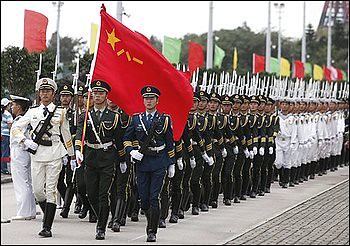
Chinese People's Liberation Army (PLA) personnel parade during the open day of Stonecutter Island Navy Base in Hong Kong Saturday, March 6, 2010., a photo by Pan-African News Wire File Photos on Flickr.
China sends ships near disputed island after Clinton's veiled warning
By Saibal Dasgupta, TNN | Jan 20, 2013, 06.10 AM IST
BEIJING: China sent ships around the Japan-controlled Diaoyu islands on Saturday, in response to a veiled US warning to not create problems. Three Chinese surveillance vessels sailed around the islands in the East China Sea, which Beijing claims as its own, for nearly five hours on Saturday.
China is upset with a statement by United States secretary of state Hillary Clinton, who said on Friday that her government was opposed to "any unilateral actions" to undermine Japanese authority over the islands.
The Chinese action comes amid new Japanese Prime Minister Shinzo Abe's South East Asia tour. Beijing views this as an attempt to build up anti-China sentiment in ASEAN, which includes countries like Vietnam and Philippines who have territorial disputes with China in the region. The situation around the disputed island is getting hot since last week when both China and Japan sent fighter jets as show of strength.
The official Xinhua news agency on Saturday criticized the US position, saying it "cast doubts on (US) credibility as a responsible power in the region". "It was unwise for Washington to throw support behind Japan in Tokyo's islands dispute with Beijing," Xinhua said.
"This unbalanced position has betrayed its declared intention to stay neutral," it said. The US proposal for "tighter military alliance with Japan will only encourage Tokyo's dangerously right-leaning tendency", the agency said.
Speaking at a joint news conference on Friday with Japanese Foreign MinisterFumio Kishida in Washington, Clinton said, "We do not want to see any action taken by anyone that could raise tensions or result in miscalculation that would undermine the peace, security and economic growth in the region".
U.S., Japan review defense guidelines amid tension with China
Thu, Jan 17 2013
TOKYO (Reuters) - The United States and Japan began on Thursday the revision of defense cooperation guidelines for the first time in 15 years as Prime Minister Shinzo Abe faces a territorial dispute with China and North Korea's missile and nuclear programmes.
The revision to the guidelines, which set rules on how Japanese and U.S. forces work together in or near Japan, comes after a hawkish Abe led his Liberal Democratic Party to power in an election last month.
"We would like to discuss Japanese Self Defence Forces' role and U.S. forces role with eyes on the next five, 10, 15 years and on the security environment during those periods," a Defence Ministry official told reporters, without elaborating.
The revision is due because of drastic changes in the security environment over the past 15 years including China's maritime expansion and North Korea's missile development, the Japanese government has said.
North Korea has also twice tested nuclear devices.
Japan is locked in a territorial dispute with China over a group of tiny East China Sea islets called Senkaku in Japan and Diaoyu in China, with both countries sending patrol ships and planes to areas near the isles.
The review started with a working-level meeting in Tokyo between U.S. and Japanese officials. It will likely take a year or more to complete and coincides with a U.S. "pivot" in diplomatic and security focus to Asia.
"One issue that's prevalent is whether the Abe government will reinterpret the constitution to exercise the right of collective self defence," said Nicholas Szechenyi, senior fellow at the Center for Strategic and International Studies.
"Should that policy decision be taken, it will obviously have an impact on the way the Self Defence Forces and U.S. military coordinate."
Japan recognizes it has what is known as the right of collective self-defence, meaning a right to defend with force allies under attack even when Japan itself is not being attacked.
But Japanese governments have traditionally interpreted the pacifist constitution as banning the actual exercise of the right, creating a sore spot in Tokyo's security ties with Washington. Abe wants to change the interpretation to allow Japan to exercise the right.
The Defence Ministry did not say whether the issue of the right of collective self-defence has been discussed.
(Additional reporting by Paul Eckert in Washington)
(Reporting by Kiyoshi Takenaka; Editing by Robert Birsel)
No comments:
Post a Comment